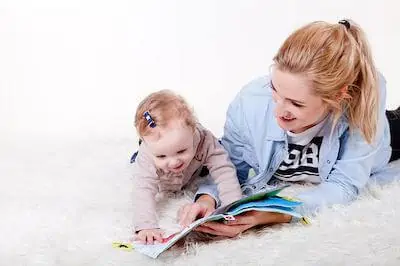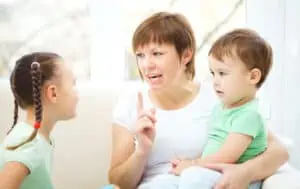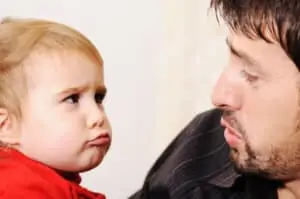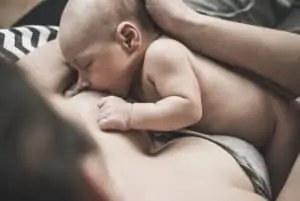As I approached the birth of my eldest, I knew going into it that we may have some speech and language challenges looming ahead. Since we lived in China and were a multicultural family, I had heard that children learning 2 languages at once often take a little longer to speak.
But I was surprised that our daughter spoke sooner than we expected. And she seemed to understand the differences between Mandarin and English too.
If your child is learning more than one language at home, you absolutely need to be patient with their speech. However, there are more things to look out for to see if it is a speech delay.
And if you’re only speaking one language in your home, you may be wondering what could be hindering your 3-year-old toddler with this milestone. When a 3-year-old is not talking but babbling or doesn’t speak clearly, parents become pretty concerned, and rightfully so!
Whether your 3-year-old doesn’t talk in sentences or you think your 3-year-old doesn’t understand anything, you’re in the right place to find out what’s going on and whether or not you need to do something about it.
Let’s start with toddlers in general though.
When you have a 2-year-old that doesn’t talk and screams a lot, it’s easy to wonder if this will go on until you walk them down the aisle at their wedding. Toddlers are sponges that soak up everything around them.
But a 2-year-old hasn’t quite the ability to process the experiences, so they scream when they’re overstimulated, frustrated, hungry, angry, happy, or excited. They don’t always have the words to express themselves.
That changes as they turn 3, though.
A 3-year-old speech delay is not autism, though. Delayed speech is surely a concern you’ll likely want to discuss with your pediatrician, but this is not specific to autism, so that doesn’t automatically mean your toddler is autistic.
There are 3 year old children that have delayed speech because of hearing loss or other things. Either way, it is important to get an evaluation to determine what’s causing this and how you can help your child.
How many words should a 3-year-old know or be able to say?
When I took my youngest for a checkup at age 3, the doctor turned to me and said he was surprised. She could speak in sentences that had 7 words. The average for a toddler at 3 is to know at least 200 words (usually much more than that) and be able to make sentences of 2 to 3 words.
Toddlers at age 3 can also have a conversation with you, and other people should be able to understand your toddler almost all of the time. That’s different from age 2 when it may be hard for others to get those little nuances.
My eldest kept calling SpongeBob “fafa” when she was age 2. I understood her, of course, but no one else did until she finally started calling him “SpongeBob” around the age of 3. I have written a helpful article to decode the toddler’s gibberish here.
How does this evolve?

Simple. You have to have interactive conversations with them, play with them, have them play with others, and experience life. They learn this way.
Read to your child, sing, play those word games, or just talk and talk and talk. This helps their own skills in vocabulary and listening.
How to tell if it’s a speech delay or normal?
With speech, it is the verbal expression of the language we use and involves the way we form those sounds and words, or articulation. Language is how we both get and give information. This is how we can communicate by speaking, writing, and nonverbal ways.
There is a difference between language problems and speech problems, but they share common ground. If your child has a language delay, she might say her words well, but she may only be able to put two of them together at a time.
If your child has a speech delay, she might be able to use words to express herself but be difficult to understand. A 3-year-old that’s not talking but understands may also have a speech delay.
The signs of speech delay should be watched, and if you’re not sure, you can always have your doctor evaluate your child. The sooner you bring any concerns, the better. Even if it’s just your own paranoia, you will have peace of mind. But if it’s not paranoia, you can help your child get on track.
Babies who don’t respond to sounds or make vocalizations (like those cooing sounds) must be checked out immediately. If your baby gets to 12 months and isn’t gesturing by pointing or waving at people, this could signal a problem with speech delay.
Additionally, children at the age of 18 months that prefer gestures rather than making sounds or have trouble imitating the sounds they hear and can’t understand simple things you ask may indicate a delay.
By two years old, if your child can’t produce words or phrases or only says some sounds but can’t communicate immediate needs, this is worrisome.
Note that:
At the age of 2 years old, you should understand about half of what your child is speaking to you, as in the case of “fafa” above. But by the age of 3 years, you should understand about 75% of what they say. And on to age 4, your child should be easy to understand by everyone, even those who have just met your child (like the preschool teacher for example).
What is the reason for speech delays?
Several things can cause speech delays. If your child has a speech delay, it is not automatically autism. Oral impairments like a problem with the tongue or palate can cause them.
Some kids have oral-motor problems when the brain area that is in charge of speech trips things up. This makes it harder for them to coordinate the mouth to make sounds, though in this case, they will likely have feeding problems too.
Problems with hearing can also impact speech, so one of the first things that your doctor should do is check for hearing problems.
But don’t freak out yet, because ear infections can affect hearing too. If your child has chronic ear infections, it could be the reason for the delay.
Here’s what you should expect:

By the age of 3, your toddler should be able to say at least 50 words, name things in pictures when you point to them, describe actions in a picture they see, like eating or running, and say their first name when someone asks. Additionally, they should be able to ask why or what, and most people should understand them.
If not, you will want to call your doctor to have your child evaluated.
For children that aren’t yet 3 years old, the best thing you can do is help them achieve more naturally. Here are some quick tips:
- Ask your toddler about their day
- Discuss what you’ll do tomorrow
- Make things fun by playing make-believe games
- When you read to them, ask them interactive questions about the story
- Have your child ‘read’ to you by telling you what they think a story is about
By keeping an eye out on things and encouraging learning, you should see if your child is hitting those milestones or needs some testing to find out how you can best help them.
Leslie Berry lives with her husband and two young daughters in Los Altos, California, where she loves helping other moms get comfortable with motherhood and embracing the insanity with facts peppered with laughs.
She loves eating too much sushi, exercising, and jamming out on her Fender. Read more about Leslie here.






